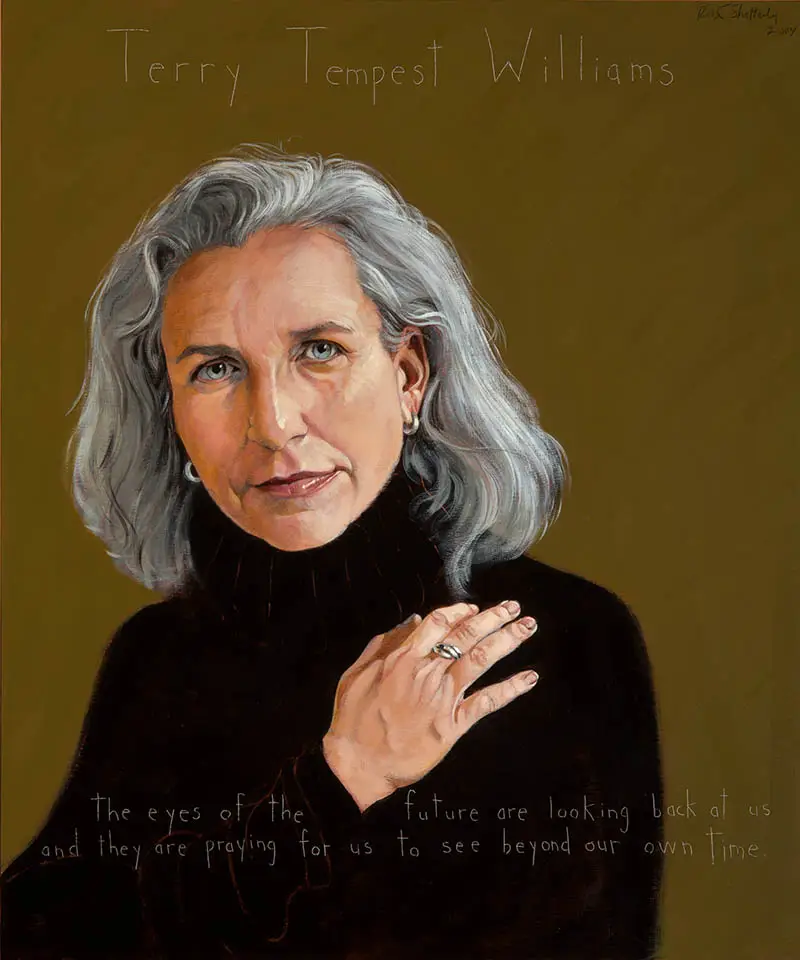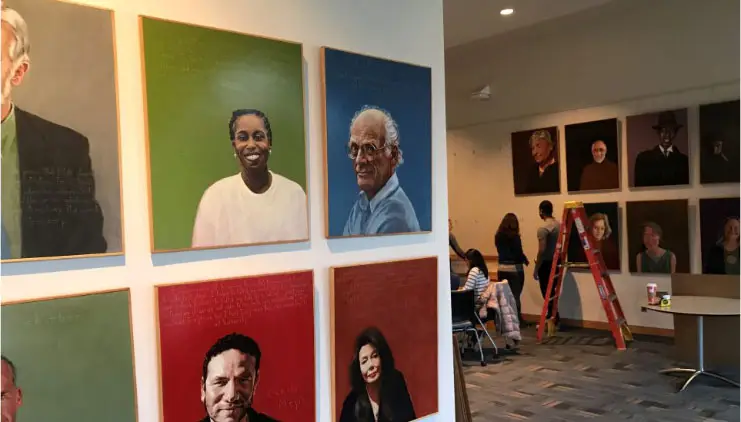
Terry Tempest Williams
Naturalist, Writer, Environmental Activist : b. 1955
“The eyes of the future are looking back at us and they are praying for us to see beyond our own time.”
Biography
When the Ecology Hall of Fame added Terry Tempest Williams to its list of honorees, it noted that she “combines all the major strains of environmental passion.” Her life’s work is driven by love of the desert and other naturally beautiful places; a passion for multigenerational land stewardship, which ties her to the region where she was born and still lives; and opposition to resource destruction, especially when it affects human health.
Williams has lived most of her life in Utah, descended from five or six generations of Mormon pioneers. “I write through my biases of gender, geography, and culture,” she says. “I am a woman whose ideas have been shaped by the Great Basin and Colorado Plateau.”
Williams is perhaps best known for her book Refuge: An Unnatural History of Family and Place (Pantheon, 1991), in which she chronicles the epic rise of Great Salt Lake and the flooding of the Bear River Migratory Bird Refuge in 1983, alongside her mother’s diagnosis of ovarian cancer, believed to have been caused by radioactive fallout from the nuclear tests in the Nevada desert in the 1950s and 60s. Refuge is now regarded as a classic in American nature writing, a testament to loss and the earth’s healing grace.
Other, more recent books include The Moon Is Behind Us (with photographer Fazal Sheikh, 2021); The Hour of Land: A Personal Topography of America’s National Parks (2016); When Women Were Birds: Fifty-four Variations on Voice (2012); and Finding Beauty in a Broken World (2008). In addition to fourteen nonfiction books, including essay collections, Williams has published two collections of poetry, coedited four books, and contributed pieces to numerous periodicals and anthologies. Two of her books are for children: The Secret Language of Snow (Sierra Club/Pantheon, 1984); and Between Cattails (Little Brown, 1985).
In 2004, Terry Tempest Williams published The Open Space of Democracy, in which she tried to define how we might break down the partisanship and polarization in our society so that we can come together to solve the political and environmental problems which threaten our democracy and our land. In it she says, “I do not think we can look for leadership beyond ourselves. I do not think we can wait for someone or something to save us from our global predicaments and obligations. I need to look in the mirror and ask this of myself: If I am committed to seeing the direction of our country change, how must I change myself?”
Williams has committed acts of civil disobedience in protest against nuclear testing in the Nevada Desert, and in Washington, D.C., with Code Pink, against the Iraq War. After cofounding the Environmental Humanities master’s degree program at the University of Utah and teaching there for thirteen years, she resigned from her faculty position amid turmoil over her innovative teaching style and her political activities.
After several years at Dartmouth College, Williams joined the Harvard Divinity School in 2017 as writer in residence and seminar leader, focusing on the spiritual implications of climate change. She is also working on a new venture called the Constellation Project, a collaboration between the Harvard Divinity School, the Planetary Health Alliance, and the Center for the Study of World Religions. The vision is to “the spiritual crisis that underlies the ecological and public health crises associated with destruction of Earth’s natural systems.”
Programs
Americans Who Tell the Truth (AWTT) offers a variety of ways to engage with its portraits and portrait subjects. Host an exhibit, use our free lesson plans and educational programs, or engage with a member of the AWTT team or portrait subjects.

Education
AWTT has educational materials and lesson plans that ask students to grapple with truth, justice, and freedom.

Exhibits & Community Engagement
AWTT encourages community engagement programs and exhibits accompanied by public events that stimulate dialogue around citizenship, education, and activism.